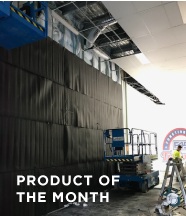There are plenty of reasons why you’d prefer privacy when you go in for healthcare treatment. Our medical issues are very private things, after all.
But there are also a lot of reasons why healthcare facilities themselves care about privacy, too – since confidentiality is typically what stands as the primary pillar of trust between medical practitioners and the people they serve.
Unfortunately, many health facilities, as well as their patients, aren’t always afforded that level of luxury. Bustling hospitals and treatment clinics are bustling for a reason, and when their walls are paper-thin and confidential conversations easily overheard, maintaining privacy can become a real challenge when you already have your health on your mind to worry about.
Whether for hospitals, psychologists, or other medical practices, the importance of privacy cannot be overstated when it comes to the integrity of their care. Doctor-patient confidentiality is vital for this reason, after all, and it’s why soundproofing is such an important – yet commonly overlooked – safeguard to the sensitive information that passes between healthcare walls.
So why is this all so important, and why is soundproofing a necessary step to take to preserve patient privacy? Let’s break down the role of noise in confidentiality to learn more.
Why are healthcare facilities so noisy?
Well, the short answer is simply because of the nature of healthcare facilities and how they’re designed. Hospitals and other facilities are typically planned with large, open layouts to make it easy to move from one room to another.
And while this is obviously useful in cases of emergency, the unfortunate downside is that the spacious, thin-walled interior of a medical facility often creates difficulty for doctors who require confidential consultations with their patients. This is also an issue in waiting rooms where individuals awaiting appointments can easily overhear private discussions.
Psychological clinics, however, are typically designed with privacy far more top-of-mind, in order to create a safe, comfortable space for the psychologist and their patient. But it’s still a concern when the walls of a psychological clinic need to be thick enough to prevent sound from escaping, while still allowing for proper ventilation to keep the space comfortable. This can be a difficult balance to strike, and it’s one reason why psychological clinics are often located in quieter areas that are away from the hustle and bustle of a medical centre or hospital complex.
The role of soundproofing in healthcare and psychology
Even in these noisy, busy, very public environments, privacy is still a fundamental right for people seeking medical or psychological care. That’s what the doctor-patient relationship is all about, after all: preserving the assumption of privacy and trust that exists between both parties when discussing personal or difficult subjects.
When discussing sensitive medical histories, mental health concerns, or other such personal matters, patients deserve the assurance that their conversations will remain confidential so that they can fully put their trust in their doctors. However, in environments where this privacy is compromised, patients might feel hesitant to disclose crucial information, impacting the level of care they receive.
Soundproofing solutions are what help offer a proactive approach to addressing privacy concerns such as these, and to create an environment for consultation rooms and therapy spaces where patients feel completely at ease when it comes to sharing sensitive or confidential information.
The solution: typical healthcare soundproofing solutions
The good news is that there are plenty of useful techniques that help contribute to making sure that soundproof treatment rooms and other insulated healthcare environments are kept safe, secure, and private.
When working with a specialist in soundproofing technology, such as Soundproof Warehouse, here are just a few of the easiest and most common solutions we can propose for your facility:
Acoustic panels
The installation of durable acoustic panels on walls or ceilings can help significantly absorb sound waves, reduce the reverberations of natural human speech, and effectively minimise the transition of noise between rooms.
Soundproofing insulation
If you’re after a more intensive solution, high-quality insulation materials can be installed within walls and floors to block out the high frequencies of sound transmission in a much more significant way.
Crack and gap sealing
Applying sealant to the loose gaps or cracks around doors, windows, or ducts can also help prevent sound leakage through different rooms and environmental sectors.
The simple soundproofing solution for enhancing healthcare privacy
All of these may sound pretty fundamental, but it all boils down to how paramount the protection of patient privacy is in medical settings.
Whether for clinical or psychiatric settings, investing in soundproofing means that healthcare practitioners can both improve communication and comply with HIPAA regulations, but also enhance the patient experience so that they can put their complete trust and patience in you.
We are the experts in soundproof treatment rooms
Whatever your soundproofing needs, you can be sure to find the solution from the experts at Soundproof Warehouse.
If you have a healthcare facility or psychiatric office in need of a privacy revamp, reach out to our team today and we’ll be glad to set up our own consultation for your best options.


















